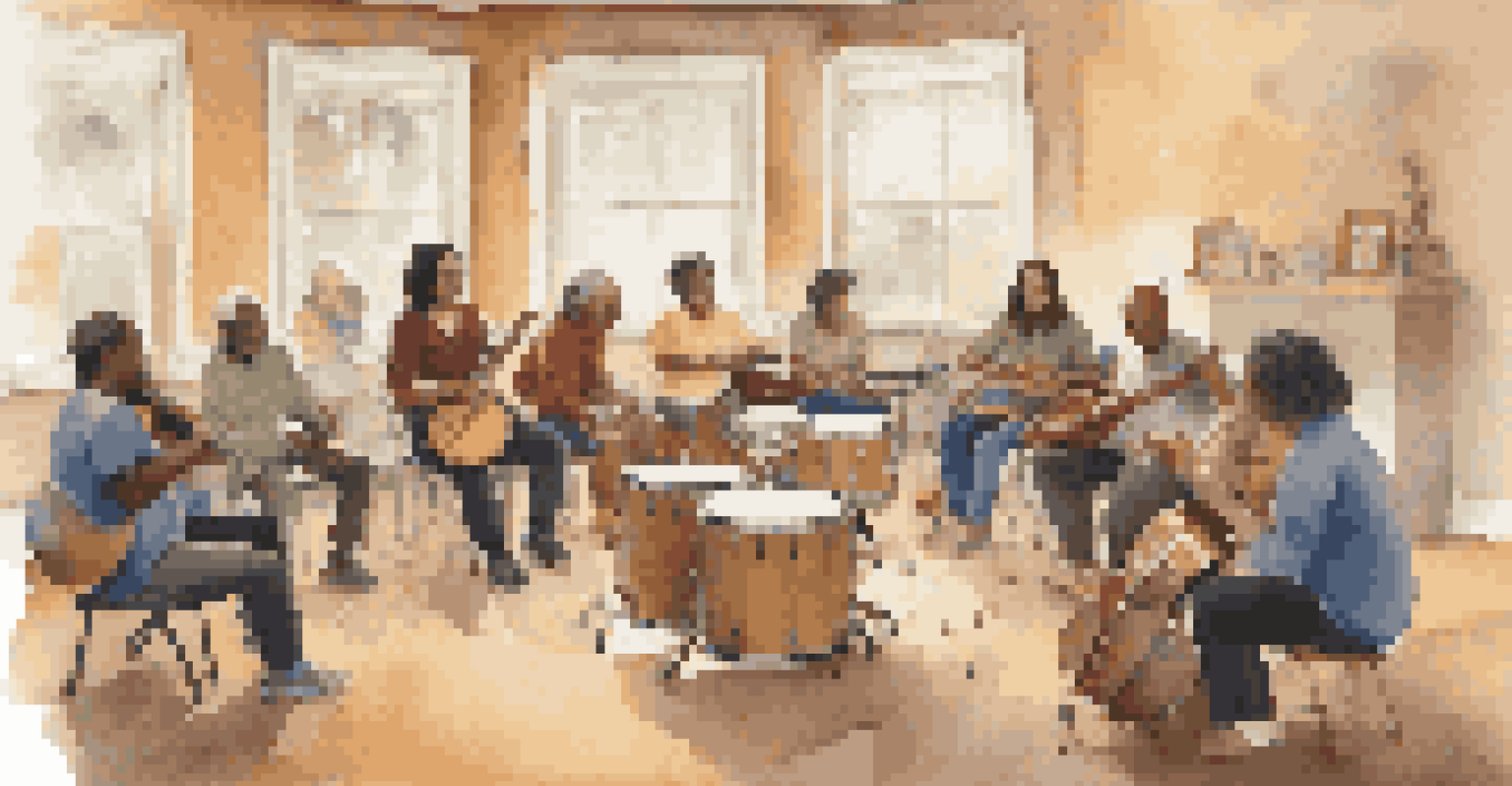The Role of Music in Shaping Collective Identity and Expression

Music as a Reflection of Cultural Identity
Music often serves as a mirror to our cultural identity, showcasing the values, traditions, and experiences of a community. For instance, folk songs carry stories that have been passed down through generations, connecting listeners to their roots. This connection helps individuals feel a sense of belonging, as they hear melodies that echo their own life experiences.
Music can change the world because it can change people.
Different genres of music can also highlight various aspects of cultural identity. For example, hip-hop emerged from marginalized communities, articulating their struggles and triumphs. By engaging with these musical forms, people not only celebrate their heritage but also educate others about their culture.
Thus, music becomes an essential tool for expressing cultural identity, allowing communities to share their stories and foster pride in their heritage. Through the rhythms and lyrics, the essence of a culture is captured, making it resonate with both local and global audiences.
The Role of Music in Social Movements
Throughout history, music has played a pivotal role in social movements, uniting people under a shared cause. From the civil rights anthems of the 1960s to contemporary protest songs, music has the power to inspire action and solidarity. For instance, songs like 'We Shall Overcome' became anthems for change, echoing the sentiments of countless activists.

These songs not only provide motivation but also create a sense of community among participants. When people sing together at protests or rallies, they forge connections that transcend individual differences, reinforcing a collective identity. This shared musical experience amplifies their message and fosters resilience.
Music Reflects Cultural Identity
Music serves as a mirror to cultural identity, connecting individuals to their roots and showcasing community values.
Furthermore, music can help to document social movements, preserving their legacies for future generations. By capturing the emotions and struggles of a time, songs become historical artifacts that remind us of the power of unity in the face of adversity.
Music as a Tool for Personal Expression
While music shapes collective identity, it also serves as a powerful medium for personal expression. Individuals often turn to songwriting or music creation as a way to articulate their feelings and experiences. For example, many artists write songs that reflect their personal struggles, hopes, or dreams, allowing them to connect with listeners on a deeper level.
Where words fail, music speaks.
This personal connection to music can foster a sense of belonging, as listeners find solace in lyrics that resonate with their own lives. When someone hears a song that perfectly captures their feelings, it can feel like a validation of their experiences, reinforcing their identity.
In this way, music acts as both a personal and collective expression, creating a dialogue between the artist and their audience. This duality showcases the versatility of music as a form of communication, bridging individual experiences with broader societal themes.
The Influence of Technology on Music and Identity
With the rise of technology, the way we create, share, and consume music has transformed dramatically, shaping our identities in new ways. Platforms like Spotify and YouTube have made it easier than ever for artists to reach global audiences. This democratization of music allows diverse voices to emerge, enriching the tapestry of collective identity.
Social media has also played a crucial role in how music influences identity. Artists can engage directly with fans, fostering communities that share similar tastes and values. For instance, TikTok has propelled many songs to viral status, often leading to the creation of trends that reflect contemporary youth culture.
Music's Power in Social Movements
Throughout history, music has united people in social movements, inspiring action and fostering a sense of community.
However, this accessibility comes with challenges, such as the saturation of content and the pressure on artists to conform to popular trends. Yet, amidst these challenges, technology continues to provide opportunities for self-expression and connection, reflecting the ever-evolving nature of music in shaping our identities.
The Power of Music in Healing and Community Building
Music has long been recognized for its therapeutic qualities, aiding in healing and emotional well-being. Community music programs, for instance, bring people together, fostering connections through shared musical experiences. This communal aspect of music can be particularly powerful in times of crisis, providing solace and support.
Participating in group music activities, such as drumming circles or choirs, creates a sense of belonging and collective purpose. In these settings, individuals can express their emotions safely, often finding comfort in the shared experience of creating something beautiful together. This can be particularly impactful for marginalized groups seeking community and support.
Moreover, music therapy has shown promising results in various settings, helping individuals process trauma and build resilience. By harnessing the power of music, communities can heal together, reinforcing their collective identity while addressing personal struggles.
The Globalization of Music and Cultural Exchange
As the world becomes more interconnected, music serves as a vital avenue for cultural exchange, enriching collective identities across borders. Genres like reggaeton and K-pop illustrate how music can transcend geographical boundaries, creating hybrid identities that celebrate diversity. This fusion of styles allows communities to connect with global audiences while retaining their unique cultural flavors.
Collaborations between artists from different backgrounds also highlight the power of music to bridge cultural divides. For example, the collaboration between American and African musicians has given rise to unique sounds that reflect a blend of influences, fostering cross-cultural understanding and appreciation.
Technology Shapes Music and Identity
The rise of technology has transformed how we create and consume music, influencing personal and collective identities.
However, globalization also raises questions about cultural appropriation and the commercialization of music. It's essential to navigate these discussions thoughtfully, ensuring that the voices of original cultures are respected and celebrated in this ever-evolving musical landscape.
Music's Role in Shaping Future Identities
Looking ahead, music will continue to play a crucial role in shaping collective identities as society evolves. Emerging genres and trends will reflect the changing values and experiences of future generations, providing a soundtrack for their lives. Social issues such as climate change, equality, and mental health are likely to inspire new movements in music, further intertwining art with activism.
Moreover, as technology advances, the ways we interact with music will also change. Virtual reality concerts and AI-generated music are just the tip of the iceberg in terms of how our musical experiences might evolve. These innovations will create new opportunities for connection and expression, reshaping how we understand our identities.

Ultimately, the role of music in shaping collective identity is a dynamic and ongoing process. As we navigate an increasingly complex world, music will remain a vital tool for expression, connection, and understanding, reflecting the rich tapestry of human experience.